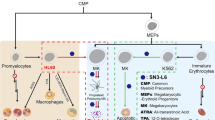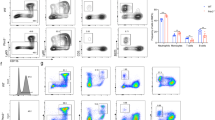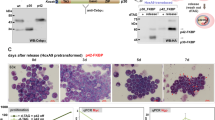Abstract
Some phorbol diesters, the most potent of which is 12-O-tetradecanoylphorbol-13-acetate (TPA), exert two different effects on the differentiation of leukaemic cells in vitro: they reversibly inhibit the differentiation in Friend mouse erythroleukaemia cells1,2 and mouse myeloid leukaemia M1 cells3, and they induce differentiation in other mouse erythroleukaemia cells4, mouse myeloid leukaemia cells5, human promyelocytic leukaemia cells5–9 and cells of patients with myeloid and myelomonocytic leukaemia10. The effect on human leukaemic cells is both irreversible and independent of the continuous presence of the drug7. We report here that TPA-induced differentiation of human promyelocytic leukaemia cells (HL60) need not be preceded by a round of DNA synthesis, and that the majority of TPA-treated cells accumulate in the G1 phase of the cell cycle.
This is a preview of subscription content, access via your institution
Access options
Subscribe to this journal
Receive 51 print issues and online access
$199.00 per year
only $3.90 per issue
Buy this article
- Purchase on Springer Link
- Instant access to full article PDF
Prices may be subject to local taxes which are calculated during checkout
Similar content being viewed by others
References
Rovera, G., O'Brien, T. & Diamond, L. Proc. natn. Acad. Sci. U.S.A. 74, 2894–2898 (1977).
Yamasaki, H. et al. Proc. natn. Acad. Sci. U.S.A. 74, 3451–3455 (1977).
Kasukabe, T., Honma, Y. & Hozumi, M. Gann 70, 119–123 (1979).
Miao, R. M., Fieldsteel, A. M. & Fodge, D. W. Nature 274, 271–272 (1978).
Lotem, J. & Sachs, L. Proc. natn. Acad. Sci. U.S.A. 76, 5158–5162 (1979).
Huberman, E. & Callahan, M. F. Proc. natn. Acad. Sci. U.S.A. 76, 1293–1297 (1979).
Rovera, G., Santoli, D. & Damsky, C. Proc. natn. Acad. Sci. U.S.A. 76, 2779–2783 (1979).
Rovera, G., O'Brien, T. & Diamond, L. Science 204, 868–870 (1979).
Vorbrodt, A., Meo, P. & Rovera, G. J. Cell Biol. 83, 300–307 (1979).
Rovera, G. et al. in Erythropoiesis and Differentiation of Friend Leukaemic Cells (ed. Rossi, G.) (Elsevier, Amsterdam, in the press).
Yam, L. T., Li, C. Y. & Crosby, W. M. Am. J. clin. Path. 55, 283–290 (1971).
Li, C. Y., Yam, L. T. & Lam, K. W. J. Histochem. Cytochem. 18, 901–910 (1970).
Pike, B. L. & Robinson, W. A. J. cell. Physiol. 76, 77 (1970).
Van Furth, R. Semin. Hemat. 7, 125–141 (1970).
Baserga, R. & Malamud, D. Autoradiography: Techniques and Application 18 (Hoebner, New York, 1969).
Collins, S. J., Gallo, R. C. & Gallagher, R. E. Nature 270, 347–349 (1977).
Collins, S. J., Ruscetti, F. W. & Gallo, R. C. Proc. natn. Acad. Sci. U.S.A. 75, 2458–2462 (1968).
Author information
Authors and Affiliations
Rights and permissions
About this article
Cite this article
Rovera, G., Olashaw, N. & Meo, P. Terminal differentiation in human promyelocytic leukaemic cells in the absence of DNA synthesis. Nature 284, 69–70 (1980). https://doi.org/10.1038/284069a0
Received:
Accepted:
Issue Date:
DOI: https://doi.org/10.1038/284069a0
This article is cited by
-
A function of p21 during promyelocytic leukemia cell differentiation independent of CDK inhibition and cell cycle arrest
Oncogene (1999)
-
Local and metastatic growth and in vivo differentiation of human myeloid leukemia cells transplanted in nude mice
Virchows Archiv A Pathological Anatomy and Histopathology (1984)
-
Cytomorphological changes in human tumor cells under the influence of highly polar compounds
Bulletin of Experimental Biology and Medicine (1981)
-
Human cell-surface glycoprotein with unusual properties
Nature (1980)
Comments
By submitting a comment you agree to abide by our Terms and Community Guidelines. If you find something abusive or that does not comply with our terms or guidelines please flag it as inappropriate.



